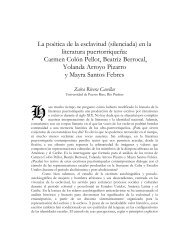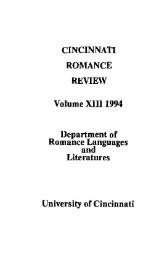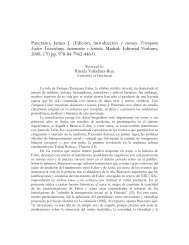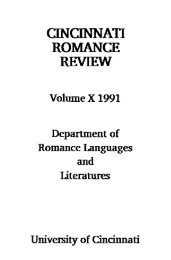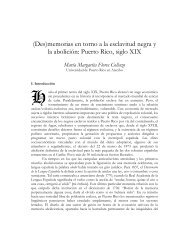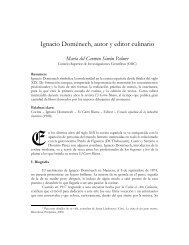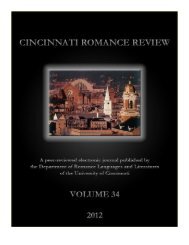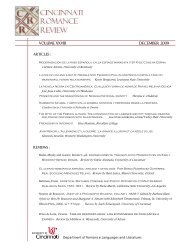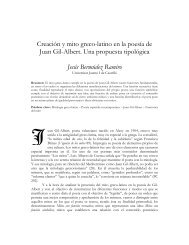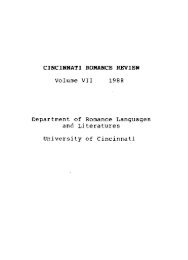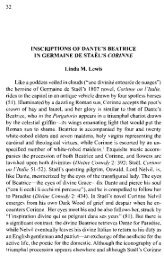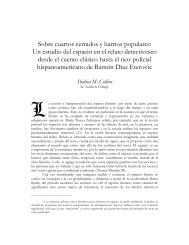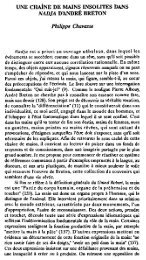Volume 30 (2011) - Cincinnati Romance Review
Volume 30 (2011) - Cincinnati Romance Review
Volume 30 (2011) - Cincinnati Romance Review
Create successful ePaper yourself
Turn your PDF publications into a flip-book with our unique Google optimized e-Paper software.
178<br />
GALADRIEL MEHERA GERARDO<br />
Vasconcelos, was miscegenation. While Spencer and other Social Darwinists held that<br />
racial mixing destroyed biological strengths leaving miscegenated individuals with the<br />
worst characteristics of each group, Vasconcelos maintained the opposite.<br />
Miscegenation would allow for the elimination of the weakest characteristics of each<br />
race and the continuation of the stronger traits (Vasconcelos 26, 31, 40). Vasconcelos<br />
believed that Latin America could be a place where a new race, which he called the<br />
cosmic race, supposedly a mixture of all races, could flourish.<br />
Vasconcelos, for all his contention to the contrary, fell victim to the same<br />
Eurocentrism he sought to counter. Although he championed racial mixing, he did so at<br />
least partially because he viewed it as a means of eliminating Mexico’s “race problem”—<br />
indigenous people. Likewise, for all his lip service to the greatness of the indigenous<br />
past, Vasconcelos furthered negative stereotypes of indigenous people, referring to<br />
them as a pre-historic, “Atlantean” race (Vasconcelos 7-8). From his point of view, for<br />
all the great achievements of the “red men,” they had gone to “sleep millions of years<br />
ago, never to awaken” (Vasconcelos 16). Their only potential retribution would be<br />
through mixing with other groups, becoming part of the cosmic race, and by extension,<br />
becoming extinct.<br />
Though Vasconcelos saw Africans as one of the “four racial trunks”<br />
(Vasconcelos 9), he clearly had little regard for them. He rarely mentioned them, and<br />
when he discussed them he positioned racial mixing as a “solution” for their undesirable<br />
characteristics. Vasconcelos stated, “In the Ibero-American world, the problem,”—by<br />
which he means people of African descent—“does not present itself in such crude<br />
terms” (26). Racial mixing, Vasconcelos continued, had already begun to and would<br />
soon eliminate the problem of Mexico’s “very few Blacks” (26). Furthermore,<br />
Vasconcelos associated “blackness” with the undesirable characteristics that would<br />
gradually be weeded out through what he called “aesthetic eugenics.” He compares the<br />
“voluntary extinction” of “Blacks” to the “uglier stocks” that “will give way to the more<br />
handsome” (32). In the few other instances when Vasconcelos mentioned Africans he<br />
did so deploringly, complaining of the “damnation and irreparable decadence of the<br />
Black” (34), and their eagerness “for sensual joy, intoxicated with dances and unbridled<br />
lust” (21-22).<br />
Vasconcelos clearly was not ignorant of North Atlantic ideas about African<br />
racial characteristics. Having grown up along the Mexican border with Texas, middleclass<br />
Vasconcelos was educated on the U.S. side of the border (Valdés-Ugalde 594).<br />
Although he envisioned the United States and Mexico as diametrically opposed, he<br />
seems to have accepted North Atlantic presumption of African racial inferiority, just as<br />
he tacitly accepted many other pseudo-scientific racial notions—the inferiority of<br />
Asians, the barbarism of indigenous Americans, and the intellectual supremacy of<br />
Europeans. And Vasconcelos maintained his negative view of people of African descent<br />
even after experiencing U.S. racism first hand, both in his youth and in the years he<br />
lived in exile in the U.S. before authoring La Raza Cósmica. Whereas Vasconcelos saw<br />
<strong>Cincinnati</strong> <strong>Romance</strong> <strong>Review</strong> <strong>30</strong> (Winter <strong>2011</strong>): 172-183.



